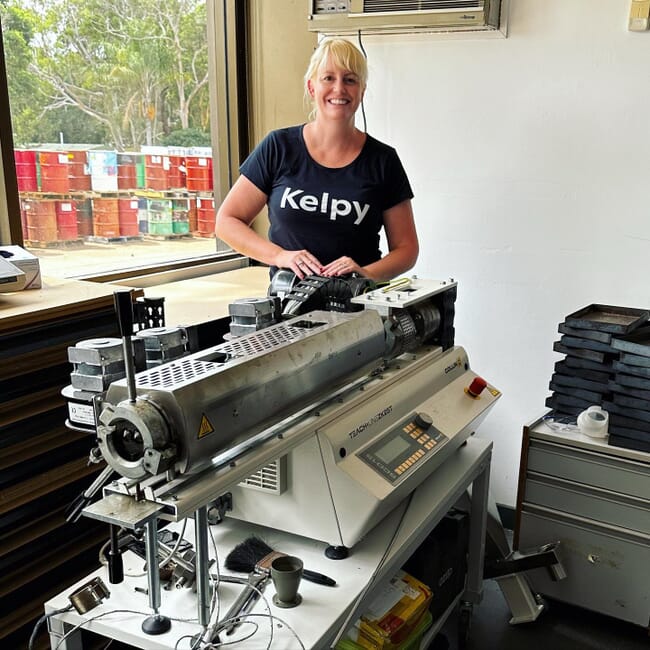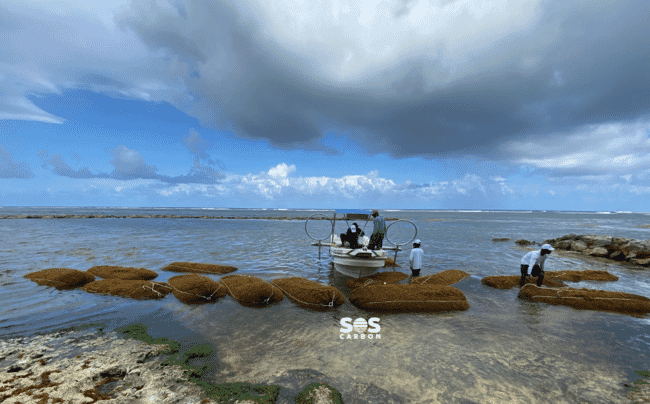
Quin's father was a fisherman in Western Australia and she is only too aware of the issues facing the country's coastal communities and marine biodiversity © Kelpy
Kelpy says that its technology can turn almost any variety of seaweed into bioplastic pellets that can be used in current plastic manufacturing machinery, meaning plastic producers can simply replace their oil-based plastic pellets with 100 percent renewable materials today.
While other seaweed bioplastic companies do exist, according to Kelpy, they are the first company "to create a 100 percent bio-derived, rigid packaging that can be made using seaweeds from any region, including waste streams and pelagic Sargassum as seen in major influxes overseas".
According to Kelpy their pellets are the most sustainable, versatile and affordable seaweed-based bioplastic on the market. Kelpy has designed their pellets to be used in standard injection moulding equipment without the need for retrofitting, making the transition to more sustainable packaging simpler, faster and more cost-efficient than ever before.
The pellets can be used in creating both soft, malleable plastics
(such as sachets, films, and packaging) and rigid plastic (for uses like
food containers, drink bottles, and even sunglasses). The pellets can even be
customised at the creation stage to have a set lifecycle, so Kelpy’s plastic
packaging can be made to break down in compost within months.

The huge volumes of Sargassum currently being washed up in areas such as the Caribbean are a potential source of bioplastic material for companies such as Kelpy © SOS Carbon
Since its launch in March 2021, the female-founded startup has already commenced pilots with a number of multinational companies for the exclusive solution it presents, including Colgate Palmolive and Unilever. Kelpy has also earned $150,000 in funding through Startmate and The NSW MVP Grant, and they were the first Australian startup to make it into the Ab-Inbev 100+accelerator.
The flexibility of using multiple varieties of seaweed means that the raw materials are easier to harvest and cheaper to produce, while still creating a high quality, compostable and marine degradable product. As seaweed is used in new ways for sustainable solutions, this flexibility means that Kelpy can keep their costs lower as the demand for specific seaweed increases.
Seaweed biopolymer applications are on the rise as demand for sustainable materials increases – and it’s creating a much-needed opportunity for climate-affected coastal communities in developing nations. Kelpy is working closely with First Nations communities from around the world – who have been using seaweed for food, storage, clothing, and domestic uses for thousands of years – to ethically and sustainably harvest from seaweed farms, aquaculture bioremediation and invasive blooms.
With 80 percent kelp loss around Australia, Kelpy is committed to sourcing ethically and regeneratively.
“The potential of the blue economy to improve the social and environmental fabric of the planet is enormous. Kelpy offers a regenerative solution that not only prevents harmful plastic from entering the ocean, but regenerates our oceans and the communities that rely on ocean crops for their economic survival,” said Fionnuala Quin, founder and CEO of Kelpy, in a press release.
“Australia has a vast marine estate with enormous economic and environmental wealth, and a prosperous and healthy blue economy could be worth $100 billion each year by 2025. To reach this we need to support the health of our oceans, which starts with finding new solutions to keep plastics out of our oceans and restore the health of our kelp forests,” she added.




